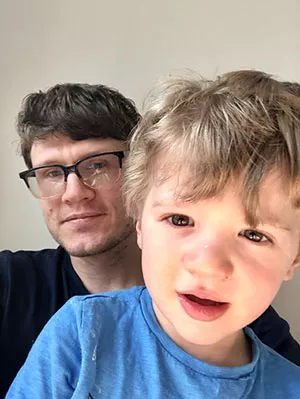
Talking truthfully to children about viruses and pandemics is key, says UTM Psychology prof
Though kids might be sidelined from school for the time being, assistant professor Samuel Ronfard says we can still be educating them on currently relevant concepts like germs, global pandemics, and physical distancing, in honest and clear terms.
“One thing that research has shown is that young kids – even at 4 and 5 years old – can really understand more than we give them credit for and they can put things together in ways we didn’t think they were able to,” says Ronfard.
“If you explain to them why people get sick and how that relates to the things that we have to do, for example social distancing, washing hands, and things like that, that will make a big difference.”
Ronfard, who joined UTM’s Department of Psychology in 2019, is the Director of The Childhood Learning and Development Lab.
His work explores how children learn about, come to believe in, and come to understand ideas and concepts that defy their everyday experiences and their intuitive theories about how the world works. Ronfard has garnered extensive academic credentials in education having completed a Master’s and Doctorate in Education at Harvard and a Postdoctoral appointment at Boston University, as well as a four-year stint teaching students with special needs in New York City.
He says that while being informative is the way to go, it is not advisable to express all your worries to children.
“Teaching them about germs and how to avoid spreading viruses is good, but it’s important to be careful in what you’re sharing in that sense because your fears and anxieties will become their fears and anxieties,” says Ronfard.
He says that teaching children about the causal mechanisms of illness transmission has been found to effective not only in getting children to better understand these concepts but also in influencing their engagement in preventative behaviors. This is because helping children understand why we do things, like washing our hands and why we engage in social distancing, helps them reason through situations we don’t teach them about. It allows them to think for themselves rather than simply dos and don’ts.
“Ultimately I think it makes kids feel better when they understand why we are taking these measures, like handwashing and physical distancing,” says Ronfard.
“It becomes a thing that we do that’s kind of happy: we are doing it because we’re trying to protect people’s lives; we are trying to do things that are going to help. So, by giving that information we are really turning it into a positive message for the kids.”
To hear the full interview with Professor Ronfard and find out more about his work and advice about talking to kids, and also how he is spending his own time at home with his young child, tune in to the latest episode of VIEW to the U: https://soundcloud.com/user-642323930/samuel-ronfard
